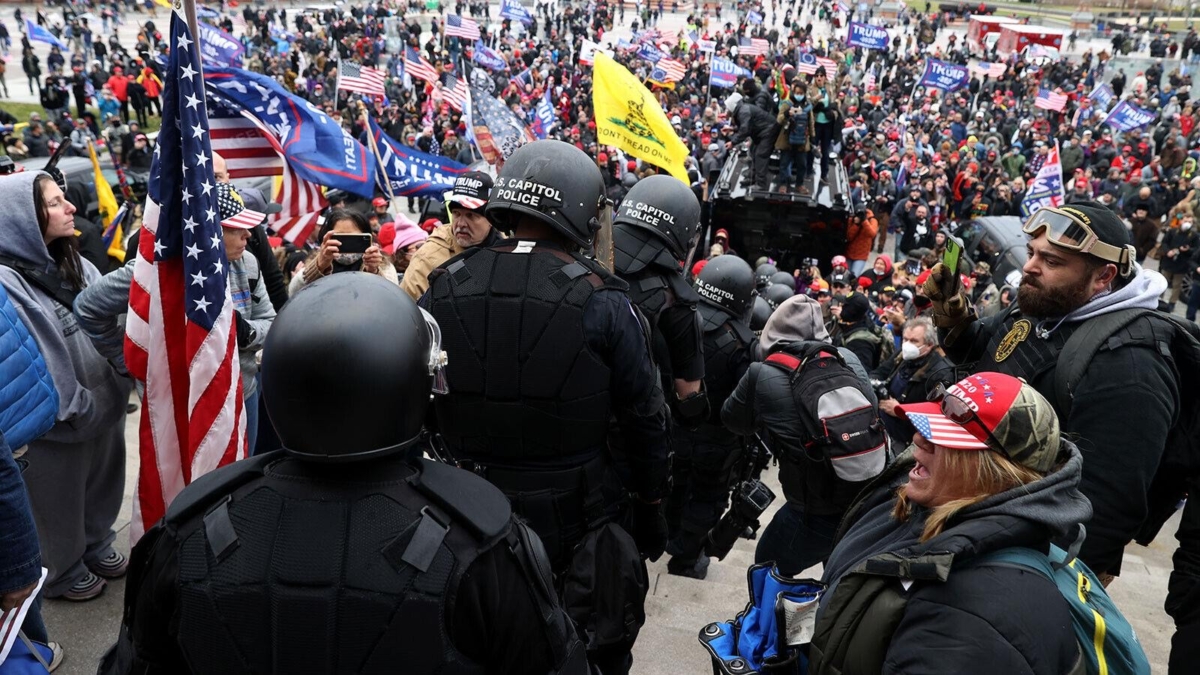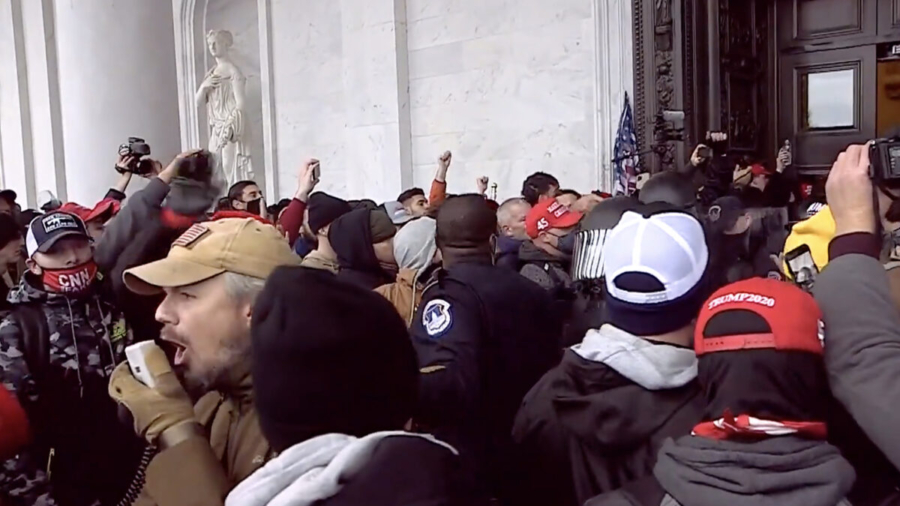The federal judge overseeing the Oath Keepers seditious-conspiracy trial in Washington, D.C., twice refused to allow defense testimony on Nov. 14 from an Oath Keeper and retired New York police sergeant who led the rescue of 16 U.S. Capitol Police officers on the east side of the Capitol on Jan. 6, 2021.
Judge Amit Mehta watched a video shot by a Florida-based videographer showing the rescue operation, before ruling that testimony by Michael Nichols would not be probative or relevant to the five defendants on trial in the case.
It was a contentious beginning to the eighth week of the trial of Oath Keepers founder Elmer Stewart Rhodes III, Kelly Meggs, Jessica Watson, Kenneth Harrelson, and Thomas Caldwell. The five are charged with seditious conspiracy and a host of other counts. The defense could wrap up its work this week, followed by closing arguments. The trial began on Sept. 27.
Nichols and videographer Rico La Starza were subpoenaed by Meggs’ attorneys Stanley Woodward and Juli Haller.
At issue was a short video that showed Capitol Police Lt. Tarik Johnson asking Nichols and another Oath Keeper named Steve to help him get trapped officers out of the foyer inside the Columbus Doors. Johnson was wearing a red Make America Great Again (MAGA) ball cap—something he said he wore for his own protection.
La Starza’s video showed that the trio worked their way through the thick crowd up to the Columbus Doors and went inside. A short time later, Nichols led out a line of 15 officers clad in riot gear and one officer in a patrol uniform.
As the group descended the stairs, other Oath Keepers—including Roberto Minuta, Brian Ulrich, Ricky Jackson, and Jonathan Walden—moved in to clear a path for the police officers. None of the men on trial were involved in the rescue. Minuta and Walden face trial on federal charges for being at the Capitol. Ulrich took a plea deal and was found guilty of seditious conspiracy.
The testimony debate was unusual since federal prosecutors also subpoenaed Nichols to appear as a rebuttal witness for the government. Despite the subpoena he had issued by the court on Oct. 30, Assistant U.S. Attorney Jeffrey Nestler told Mehta that Nichols should not be allowed to testify for the defense.
After a brief discussion, Mehta cut off the attorneys and ruled that neither Nichols nor La Starza would appear before the jury.
Second Attempt Also Fails
Later in the day, attorney Brad Geyer—who represents Harrelson—asked Mehta to reconsider his ruling. Geyer argued that under the rule of completeness, Nichols’ testimony would demonstrate the overall mission of the Oath Keepers that day. Mehta declined to reconsider. Nichols and La Starza were released as potential witnesses.
“We tried to testify, and they wouldn’t allow us,” Nichols told The Epoch Times. “The big deal here is, regardless of anything, we did the right thing. We are part of a group with the idea of doing the right thing—that is also these guys.”
Nichols’ wife Whitney, who was in the courtroom when the argument about her husband’s testimony played out, said she felt Judge Mehta was “dismissive” even though at least six Oath Keepers were involved in the operation.
“They were involved in helping with that rescue,” she said. “So, you know, that point was made: look, these guys, although they didn’t communicate directly, there was this informal understanding going on that took place organically. But no, he [Judge Mehta] didn’t want to hear any of it. He just shook his head the whole time.”
Nichols said Nestler called his cell phone on the evening of Nov. 13 just as they arrived in D.C. and told him he would not be needed as a prosecution witness. Nichols said Nestler then asked if he had been subpoenaed by the defense.
Whitney Nichols said Nestler patched FBI Special Agent Michael Palian into the brief phone call.
“Immediately, Mike and I both respond to that,” she said. “Not verbally but you know, we both looked at each other like, ‘Oh my God, the FBI is on the phone.’ You know, it’s scary.”
Between the week after Jan. 6 and late September 2021, the Nichols were visited three times by federal agents: two visits from the FBI and the other from the Department of Homeland Security. During those interviews, they were told it appeared they were helping police on Jan. 6 and were not being considered for charges, videos recorded by Whitney Nichols show.
After Nichols and La Starza were released from court, they sat in on the trial as a show of support for the four Oath Keepers and one associate who are on trial.
“Mike and I both thought it was important to at least represent to these guys in there that there are people out there willing to stand up for them, even if the court won’t allow it,” Nichols said. “I can’t speak for their reactions when they figured out that Mike wasn’t going to be allowed to testify, but I mean, I could certainly feel the disappointment. I felt it immensely.”
The Nichols and La Starza visited the U.S. Capitol later on Nov. 14. They spoke with two U.S. Capitol Police officers, one of whom was injured on the east steps on Jan. 6, Nichols said.
“We asked about the guy that put the Trump hat on, and he said he was trying to rescue policemen; he was there with police that were trapped, and he tried to rescue them,” Nichols said.

The second officer voiced the same opinion, Nichols said, saying Lt. Johnson was trying to rescue fellow officers that afternoon.
In August 2021, Johnson was found guilty by the U.S. Capitol Police Office of Professional Responsibility (OPR) of two rules violations: conduct unbecoming and unsatisfactory performance. His red Trump cap was a major issue in the investigation.
Johnson defended his use of the cap, explaining that the crowd listened to him more when he wore it. He told OPR investigators that his primary goal was to get the officers to safety.
Nichols said he was mentally prepared to give testimony at the Oath Keepers trial.
“I’m glad that I’m going home, but I hate the fact that I wasn’t actually able to get up there and say anything,” he said.
From The Epoch Times

